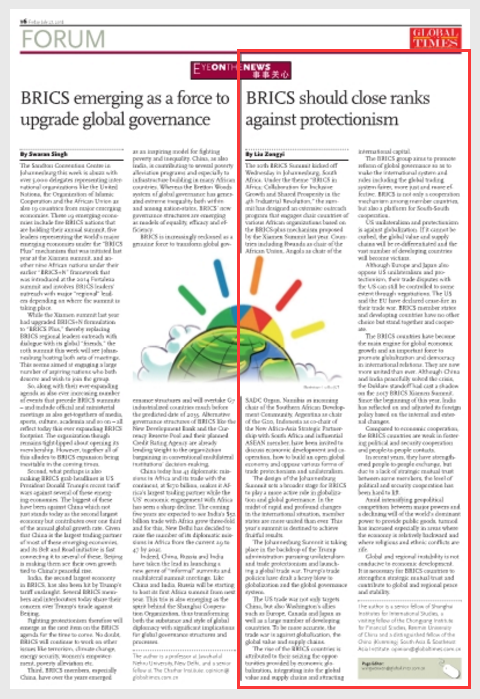Global Governance
Your Present Location: PROGRAMS> Global GovernanceLiu Zongyi: BRICS should close ranks against protectionism
By Liu Zongyi Source: Global Times Published: 2018-7-26
The 10th BRICS Summit kicked off Wednesday in Johannesburg, South Africa. Under the theme "BRICS in Africa: Collaboration for Inclusive Growth and Shared Prosperity in the 4th Industrial Revolution," the summit has designed an extensive outreach program that engages chair countries of various African organizations based on the BRICS-plus mechanism proposed by the Xiamen Summit last year. Countries including Rwanda as chair of the African Union, Angola as chair of the SADC Organ, Namibia as incoming chair of the Southern African Development Community, Argentina as chair of the G20, Indonesia as co-chair of the New Africa-Asia Strategic Partnership with South Africa and influential ASEAN member, have been invited to discuss economic development and cooperation, how to build an open global economy and oppose various forms of trade protectionism and unilateralism.

The design of the Johannesburg Summit sets a broader stage for BRICS to play a more active role in globalization and global governance. In the midst of rapid and profound changes in the international situation, member states are more united than ever. This year's summit is destined to achieve fruitful results.
The Johannesburg Summit is taking place in the backdrop of the Trump administration pursuing unilateralism and trade protectionism and launching a global trade war. Trump's trade policies have dealt a heavy blow to globalization and the global governance system.
The US trade war not only targets China, but also Washington's allies such as Europe, Canada and Japan as well as a large number of developing countries. To be more accurate, the trade war is against globalization, the global value and supply chains.
The rise of the BRICS countries is attributed to their seizing the opportunities provided by economic globalization, integrating into the global value and supply chains and attracting international capital.
The BRICS group aims to promote reform of global governance so as to make the international system and rules including the global trading system fairer, more just and more effective. BRICS is not only a cooperation mechanism among member countries, but also a platform for South-South cooperation.
US unilateralism and protectionism is against globalization. If it cannot be curbed, the global value and supply chains will be re-differentiated and the vast number of developing countries will become victims.
Although Europe and Japan also oppose US unilateralism and protectionism, their trade disputes with the US can still be controlled to some extent through negotiations. The US and the EU have declared cease-fire in their trade war. BRICS member states and developing countries have no other choice but stand together and cooperate.
The BRICS countries have become the main engine for global economic growth and an important force to promote globalization and democracy in international relations. They are now more united than ever. Although China and India peacefully solved the crisis, the Doklam standoff had cast a shadow on the 2017 BRICS Xiamen Summit. Since the beginning of this year, India has reflected on and adjusted its foreign policy based on the internal and external changes.
Compared to economic cooperation, the BRICS countries are weak in fostering political and security cooperation and people-to-people contacts.
In recent years, they have strengthened people-to-people exchange, but due to a lack of strategic mutual trust between some members, the level of political and security cooperation has been hard to lift.
Amid intensifying geopolitical competition between major powers and a declining will of the world's dominant power to provide public goods, turmoil has increased especially in areas where the economy is relatively backward and where religious and ethnic conflicts are rife.
Global and regional instability is not conducive to economic development. It is necessary for BRICS countries to strengthen strategic mutual trust and contribute to global and regional peace and stability.
The author is a visiting fellow of the Chongyang Institute for Financial Studies, Renmin University of China.























































































 京公网安备 11010802037854号
京公网安备 11010802037854号





